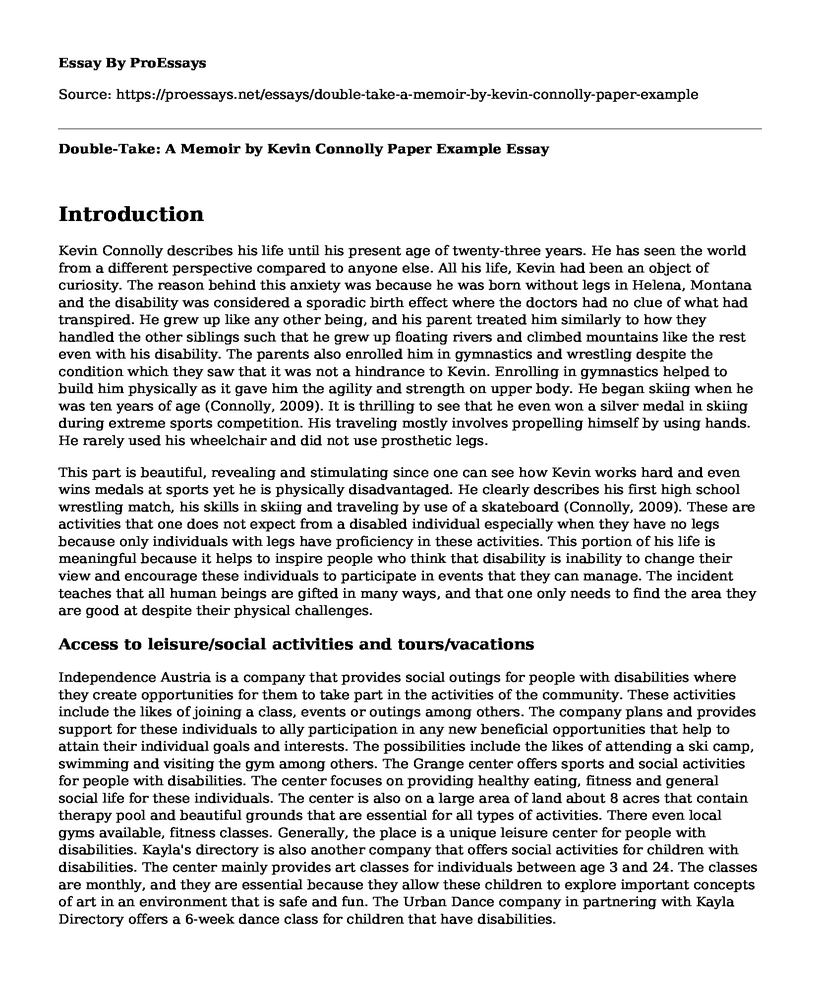Introduction
Kevin Connolly describes his life until his present age of twenty-three years. He has seen the world from a different perspective compared to anyone else. All his life, Kevin had been an object of curiosity. The reason behind this anxiety was because he was born without legs in Helena, Montana and the disability was considered a sporadic birth effect where the doctors had no clue of what had transpired. He grew up like any other being, and his parent treated him similarly to how they handled the other siblings such that he grew up floating rivers and climbed mountains like the rest even with his disability. The parents also enrolled him in gymnastics and wrestling despite the condition which they saw that it was not a hindrance to Kevin. Enrolling in gymnastics helped to build him physically as it gave him the agility and strength on upper body. He began skiing when he was ten years of age (Connolly, 2009). It is thrilling to see that he even won a silver medal in skiing during extreme sports competition. His traveling mostly involves propelling himself by using hands. He rarely used his wheelchair and did not use prosthetic legs.
This part is beautiful, revealing and stimulating since one can see how Kevin works hard and even wins medals at sports yet he is physically disadvantaged. He clearly describes his first high school wrestling match, his skills in skiing and traveling by use of a skateboard (Connolly, 2009). These are activities that one does not expect from a disabled individual especially when they have no legs because only individuals with legs have proficiency in these activities. This portion of his life is meaningful because it helps to inspire people who think that disability is inability to change their view and encourage these individuals to participate in events that they can manage. The incident teaches that all human beings are gifted in many ways, and that one only needs to find the area they are good at despite their physical challenges.
Access to leisure/social activities and tours/vacations
Independence Austria is a company that provides social outings for people with disabilities where they create opportunities for them to take part in the activities of the community. These activities include the likes of joining a class, events or outings among others. The company plans and provides support for these individuals to ally participation in any new beneficial opportunities that help to attain their individual goals and interests. The possibilities include the likes of attending a ski camp, swimming and visiting the gym among others. The Grange center offers sports and social activities for people with disabilities. The center focuses on providing healthy eating, fitness and general social life for these individuals. The center is also on a large area of land about 8 acres that contain therapy pool and beautiful grounds that are essential for all types of activities. There even local gyms available, fitness classes. Generally, the place is a unique leisure center for people with disabilities. Kayla's directory is also another company that offers social activities for children with disabilities. The center mainly provides art classes for individuals between age 3 and 24. The classes are monthly, and they are essential because they allow these children to explore important concepts of art in an environment that is safe and fun. The Urban Dance company in partnering with Kayla Directory offers a 6-week dance class for children that have disabilities.
Awareness and simulations
The article states that empathetic modeling for disabilities does not work. Experiments conducted to show imitation of the experience that the disabled individuals go through are only designed to ensure an increase in empathy and the awareness on issues that are affecting the disabled people. However, the article suggests that simulations are not useful because these non-disabled people may be less informed about the experiences of the disabled (Ladau, 2017). The thought that the writer gives behind the disability simulations is that the individuals who take part in them only end up being empathetic to the disabled people who have already adjusted to living with their conditions. The writer says that the simulation experiments are okay, but the point is that they do not change a thing in individuals with disabilities. People need to move away from equating empathy to acceptance such that they need to differentiate which of the two benefits these individuals. Humans must learn to embrace differences because they are facts of human existence. There is no need to imitate individuals with disabilities because such activities do not contribute to long-term advancement in disability rights and movements. The article is comprehensive and states different views of the writer towards simulations which he says that people need to move away from them. This is because there is much more they can do to help the disabled rather than imitating their actions. The article excellently defines the effects of simulation in only causing empathy and not necessarily acceptance.
References
Connolly, K. M. (2009). Double take: A Memoir. HarperStudio.
Ladau, E. (2017). I won't pretend that disability simulation works, HuffPost
Cite this page
Double-Take: A Memoir by Kevin Connolly Paper Example. (2022, Sep 11). Retrieved from https://proessays.net/essays/double-take-a-memoir-by-kevin-connolly-paper-example
If you are the original author of this essay and no longer wish to have it published on the ProEssays website, please click below to request its removal:
- Miles Davis Biographical Essay Example
- The Village Toy Shop: Toys and Playthings Essay
- Nutritional Requirement of Children Paper Example
- Literary Analysis Essay on People of Earth: An Introduction to World Pre-History
- Essay Sample on The Carringtons & Colbys: A Netflix Dynasty
- Essay Example on Convincing the Audience: The Art of Presentations
- Annotated Bibliography Example on School Uniforms, Discipline, & Academic Performance







